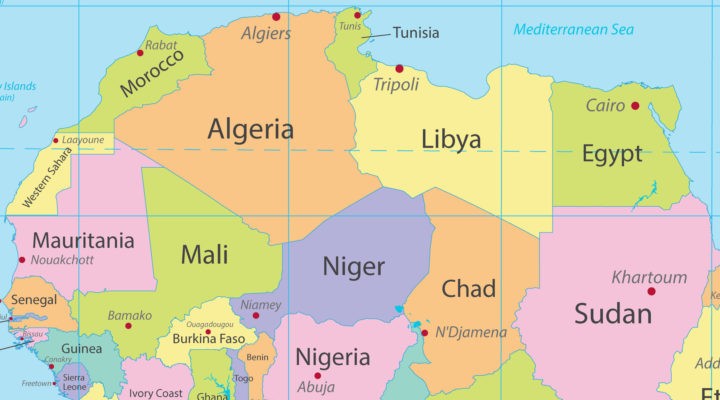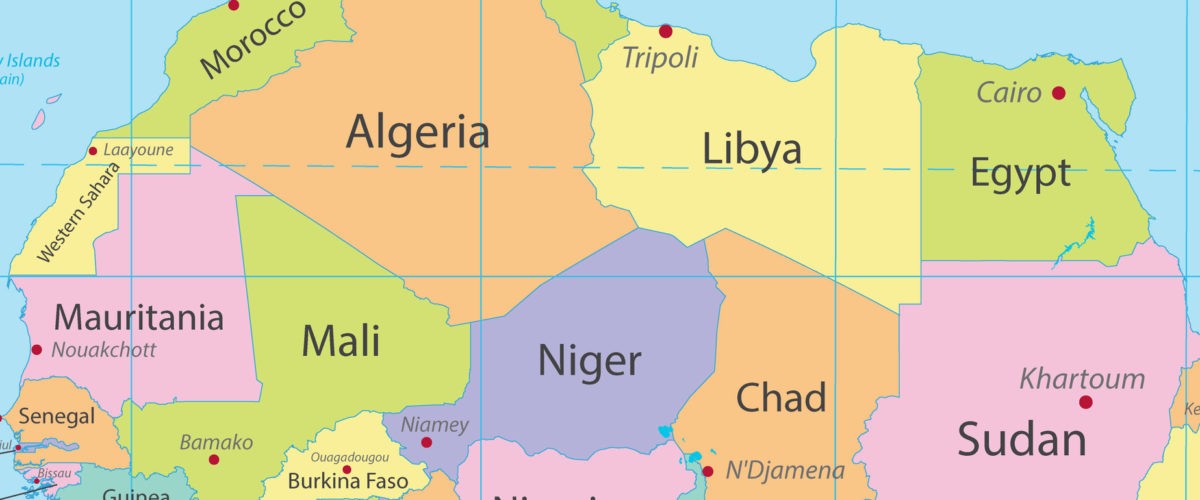The United States Commission on International Religious Freedom has expressed displeasure over a series of recent court decisions that seek to limit the religious rights of Christians in the North African country of Algeria.
USCIRF’s concern, expressed via a press release in late June, was made public after three separate court rulings against Christians in the majority Muslim country.
In March, Hamid Soudad, a 42-year-old Christian accused of insulting the prophet Mohammad, had a five-year prison sentence against him upheld by the Oran City Court of Justice. On June 6, Rachid Mohamed Seighir, pastor and bookstore owner, was sentenced to one year in prison by a court in Oran for “printing, storing or distributing materials” considered damaging to the Muslim faith. And an administrative court in Oran separately ordered that three Protestant churches that had been forcibly closed by the government in 2020 be sealed up. The order is currently being challenged in court.

Nadine Maenza
Reviewing the situation, USCIRF Chair Nadine Maenza said the decisions against the Christians show that Algeria “is headed in the wrong direction.”
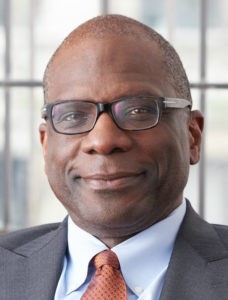
Frederick A. Davie
Frederick A. Davie, USCIRF commissioner, also said the court decisions “are blatant attempts to deny Algerian Christians their right to freedom of religion and belief.”
For this reason, Davie encourages U.S. government officials “to attend the appeals for these rulings to demonstrate our firm commitment to religious freedom for Christians and all religious minorities in Algeria.”
Prior to now, Algeria was one of many countries around the world accused of violating the religious rights of people. A report titled “Violating Rights, Enforcing the World’s Blasphemy Laws,” published last year by USCIRF said: “Researchers noted incidents in which state officials allegedly committed acts of violence, including torture or cruel, inhuman and degrading treatment or punishment, against accused blasphemers in Pakistan, Iran, Algeria and Egypt.”
Victims of blasphemy laws and other repressive policies in Algeria are not limited to Christians. Muslims and nonbelievers also are affected.
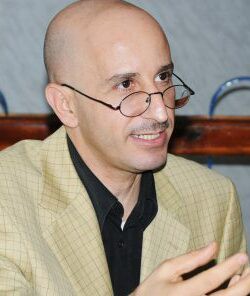
Said Djabelkhir
In a report titled “Nonbelievers in Africa,” published in June this year, USCIRF revealed that in February 2021, Said Djabelkhir, founder of the Cercle des Lumières pour la pensée libre (Circle of Enlightenment for Free Thought), appeared at a court hearing in Algiers after a fellow academic filed a complaint that his “writings about and critiques of Islamic rituals and practices represented attacks on Islam, particularly mocking the prophet Mohammed.”
Consequently, the court found Djabelkhir guilty of “offending the precepts of Islam” under Article 144 of the Penal Code and charged him with three years in prison and a fine of 50,000 dinars (approximately $375).
According to his lawyer, Djabelkhir was released on bail and is awaiting an appeal.
USCIRF had been monitoring developments in Algeria, and its impression of the country was made clear in its 2021 annual report where it recommended that the U.S. State Department include Algeria on its “Special Watch List” for engaging in or tolerating severe violations of religious freedom pursuant to the International Religious Freedom Act.
He described the coronavirus induced lockdown as “a windfall for the authorities, a curse for the revolution.”
“In 2020, religious freedom conditions in Algeria remained poor, with the government continuing its systematic repression of Christians as well as minority Muslim communities. The government resumed its campaign against the Ahmadiyya community, sentencing dozens of Ahmadis to multiyear prison sentences and often interrogating them about their religious beliefs during trials,” the report stated, adding, “In October, the government handed down several two-year prison sentences for Ahmadiyya Muslims in Constantine, while in December a court in Tizi Ouzou sentenced 25 Ahmadis to extended prison time. On Dec. 14, a court in Khenchela sentenced a prominent Ahmadiyya leader to six months in prison and a fine of 20,000 Algerian dinars ($150), nearly half the country’s average monthly wage.”
Algeria’s hardline ways have drawn the attention of Amnesty International as well. One of its reports shows that in Algeria, “authorities prevented Christian churches from operating and harassed members of the Ahmadiyya religious community. They also proceeded with mass and arbitrary expulsions of migrants. Discrimination against women in law and practice continued, as did gender-based violence and femicide. Consensual same-sex sexual relations remained criminalized, and several arrests were made. The right to form trade unions remained restricted.”
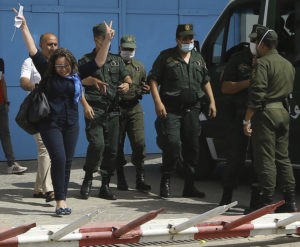
In July 2020, activist Amira Bouraoui flashes a victory signs as she is released from prison of Kolea, west of Algiers, Algeria. (AP Photo/Anis Belghoul)
One woman who has come under government watch over the past years in Algeria is Amira Bouraoui, a medical doctor and activist who, along with others, was at the forefront of the Hirak group that campaigned for an end to the government of Abdelaziz Bouteflika, who assumed power in 1999. Hirak inspired mass protests calling for an end to Bouteflika’s rule and a better country, resulting in his resignation in April 2019, 20 years after he emerged as president.
With Bouteflika out of the way, however, the agitation for a better Algeria didn’t end. Abdelkader Bensalah took charge as acting president the very month Bouteflika resigned, until December 2019 when Abdelmadjid Tebboune emerged as president after an electoral contest. Yet the clamor for change in Algeria continued to manifest in street protests.
While Tebboune’s government may have tolerated it, the coronavirus pandemic, with the attendant lockdowns in many countries, suddenly halted movements and later attempts by the likes of Bouraoui to rouse her countrymen and women back to the streets. For her activism, Bouraoui has been charged with insulting Islam, castigating the president and seeking to violate government restriction orders during the coronavirus pandemic.
Inès Osman, a French-Algerian human rights lawyer, in an article published by The Tahrir Institute for Middle East Policy, described the coronavirus induced lockdown as “a windfall for the authorities, a curse for the revolution.”
She explained: “After the government banned all public gatherings, as in other countries, Friday, March 20 (last year), was the first on which streets remained empty in more than a year. Though authorities initially stated that they had no intention of exploiting the pandemic for political purposes, they have done nothing but the opposite.” The writer further stated that, “emboldened by the end of the protests, which they had tolerated for some months, the authorities carried out an unprecedented crackdown against peaceful dissidents, including demonstrators, political activists, and human rights defenders.”
Although in January 2020 the authorities released about 70 activists, still 80 others, including a number of prominent movement leaders, remained behind bars. Between March and June, more than 200 individuals were arrested and prosecuted for “participation in unlawful assembly,” “insulting the president,” “undermining national unity,” and “harming the morale of the army.”
Such strings of arrests, in the view of analysts, is contrary to what President Tebboune promised after winning the presidential election in December 2019. He had, shortly after his victory, offered to dialogue with aggrieved groups or protesters.
Now, with his government under increasing scrutiny, the onus is on him to prove the critics wrong.
Anthony Akaeze is a Nigerian-born journalist who currently lives in Houston. He covers Africa for BNG.
Related articles:
Ten years after, could the Arab Spring bloom again? | Analysis by Erich Bridges
Asia Pacific region leads the globe in increasing restriction of religious faith

